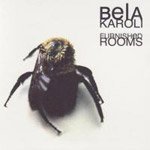I love a band that does its homework, and it seems that Bela Karoli have gone for extra credit on Furnished Rooms. The Denver trio glides through 12 tracks of original material mixed with rethinkings of “Summertime” and “Old Man River,” as well as a musical interpretation of Emily Dickinson’s poem “Some things that fly there be.” (“Prelude 2” uses part of the T.S. Eliot poem that provides the album with its title.) With violin, cello, and accordion conflicting with spare electronic percussion, this is an album accordingly concerned with the recurrent machine-versus-animal question. Offbeat, jazz-inflected vocals are the liaison between strings and synthesis.
Ignoring for a moment the stark sound set Bela Karoli utilizes, the conceptual songwriting is what sets this album apart from the crowd. I’m a big fan of resetting canonical songs in different tonalities (looking at you, David Longstreth), so my thumbs go up for Bela Karoli's rehashing of the classics, especially on “Old Man River.” All of the fierce optimism from the Show Boat version is deliberately abandoned, recontextualized as a droopy blues ballad that epitomizes the (wo)man-versus-machine theme. “Summertime” works effectively on a similar premise.
Although the retooled songs fit mostly well with the band’s original material, it’s important not to write Bela Karoli a blank check on the originality of their acoustic-electronic mix. The band acknowledges the likes of other chamber-gone-electric outfits, and it'd be shortsighted to believe that Bela Karoli's music were entirely unique. Moreover, at least half of the originals blend meaninglessly into the others, a recurring byproduct of machine-bred music. Almost as an evasion, “Old Man River” and “Summertime” succeed partly by their exclusion of electronic percussion. One can’t help but wonder what could have been had Bela Karoli stuck even more rigorously to their old/new dichotomy rather than adjusting the album's trajectory to specific artistic whims.
Although the concept could have been more developed, its aesthetic beauty might have been sacrificed. This is precisely what makes nearly every track on Furnished Rooms paradigmatic of avant-pop music. These 12 tracks are pop songs without the flourishes. Virtually no hooks (save for “Carnage”) and only an occasional climactic chorus remove the immediate accessibility. It’s this deliberately stripped-down nature that’s important to keep in mind as one’s Björk-conditioned ears yearn for more dynamic back beats. Anything more than the methodical click and snap would be out of place on such a decidedly bleak album.
“Margin,” the album’s finale, abandons all acoustic instruments besides vocals, sinking into a grimy, ambient state. For this, Furnished Rooms may just be a fable of machine’s domination over nature. But regardless of the interpretation, Bela Karoli’s ability to tastefully forge such a concept out of other sources is their biggest asset. None of these tracks will make it to your shower, but the band’s predilection for conceptual songwriting over the gratification of untainted chamber pop makes this a formidable record.
More about: Bela Karoli

